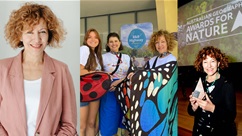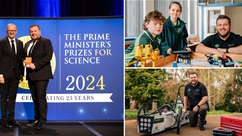KZ: Hi Michael! What inspired your decision to focus on working with reptiles and amphibians?
M: My inspiration to focus on this field mostly came from early encounter with wild reptiles. I grew up alongside bushland in western Sydney and my first encounters with blue-tongued lizards, bearded dragons, red-bellied black snakes and eastern brown snakes at an early age inspired a lifelong fascination. As a child, I borrowed every reptile book my school and local council library multiple times over and read them cover to cover to absorb as much knowledge as I could. This was further compounded with watching a range of nature documentaries on television, especially those from northern Australia.
KZ: The new Amphibian and Reptile Conservation Centre (ARC) opened in June 2024 at Taronga Zoo, Sydney! Any secrets from behind the scenes that you can share?
M: What you may not experience from the visitor-side of the glass is that each exhibit is individually climate-controlled, with temperature and humidity control to match the wild climate of the species, including regions of underfloor heating to allow the animals the choice to select the exact temperature they would like to experience.
KZ: What has been the personal highlight of your career so far?
M: The personal highlight of my career has been the establishment and successful breeding within insurance colonies for some of our most threatened species. I guide a skilled and talented team who care for these species, including producing large numbers of animals for reintroduction to their natural habitats to ensure that these species do not go extinct.
KZ: Did any activities you did as a kid provide skills that you use at work?
M: A number of things helped prepare me for this career! Spending as much time as I could in the bush, exploring and making observations on wild reptiles and amphibians. My thirst for knowledge, reading every book on the topic I could access. I joined natural history societies (like the local herpetological society) which are great for furthering knowledge and meeting people. I also kept and bred a number of species that I was passionate about, which gave great firsthand experience building enclosures and looking after these animals.
KZ: Any advice for K-Zoners who want to work in a role involving amphibians and reptiles?
M: Definitely, it is to get involved. Get out into nature and observe the wildlife in the wild, watching their behaviour. Join a local natural history society or club – you’ll make contacts and be able to participate in field trips. As you get a little older, you may be able to volunteer with a local zoo or wildlife park, which will give you more experience and open up potential career doorways.
To read the main interview with Michael McFadden, grab the 'Go Wild' 2025 issue of K-Zone, on sale now!










Comment Now!